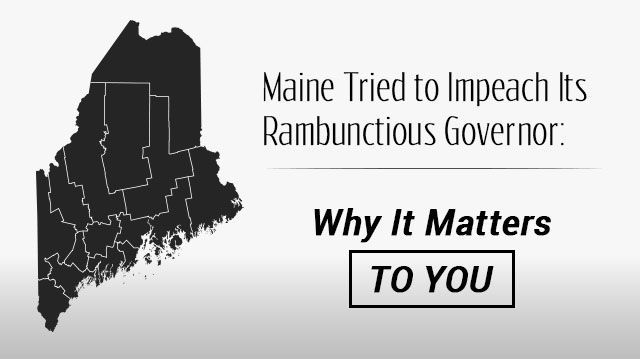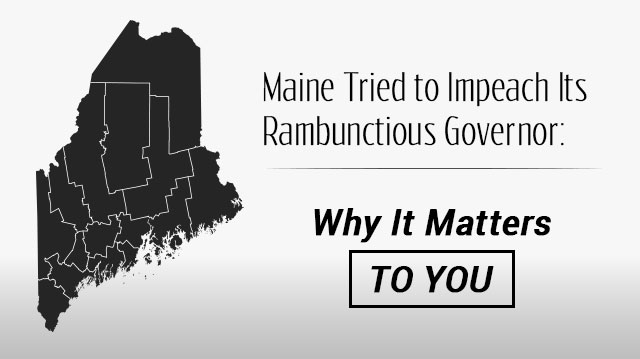
In recent years, America has seen a major increase in the polarization of politics, born from a general dissatisfaction with both liberal and conservative agendas. The consequence? An electorate is splintering into smaller, special-interest groups, making it difficult for candidates to win by majority. It is thus increasingly possible for Americans to elect political leaders who enjoy far less than 50 percent of the popular vote — and thus no mandate, either.
The recent push by Democratic lawmakers in Maine to impeach Republican Gov. Paul LePage speaks to the growing precariousness of a fractured electorate. On January 14th, lawmakers tried in vain to move the governor’s impeachment to a vote, using allegations of abuse of power by LePage in pressuring a Maine school operator into rescinding a job offer to Democratic House Speaker Mark Eves. The preliminary vote ultimately ended in a decision to postpone the impeachment debate indefinitely, with naysayers citing that it was allegations, not fact, that moved lawmakers to call for LePage’s removal from office.
LePage is nevertheless notorious for being brash, outspoken and sometimes downright offensive, with approval ratings consistently in the 30 percent range. And yet, despite being supported by a relatively small minority of Maine voters throughout his first term, LePage won a second term in 2014.
Polarizing issues increasingly drive our national conversation: same-sex marriage, abortion, health care and immigration. American voters are being divided at an alarming rate. A recent Pew Research Center study found that animosity among opposing political viewpoints has become deeply personal, with many people saying that they would be unhappy if a close family member married someone from an opposing political party.
As American politics becomes increasingly fragmented, the rift between traditional Democrats and Republicans is intensifying, too. Despite the fact that 43 percent of Americans self-identify as “Independent,” we tend to cling to the notion of a two-party system when it comes time to vote. This is largely due to the fact that the American political system is set up in such a way that it is nearly impossible for an independent candidate to get voted into office.
The advent of social media, citizen journalism and constant online newsfeeds may be another contributing factor to our fragmented voting populace. Online media allows citizens access to an unprecedented amount of information, and with this information comes the formation of strong ideological and political opinions. No longer able to fit their ideologies into clear-cut boxes, many look past strictly Democrat or Republican ideas.
As a result, focused political groups are growing in influence and “driving American politics,” the Pew Research Center study found. With more ideological candidates to choose from, the likelihood of “majority” support decreases because votes are divided across a broader, more complex political field. Ultimately, voters are left with the decision to either support their minority candidate they know is unlikely to win or to submit to the “next best option,” which seems to explain how LePage got reelected.
Of course, an increase in access to information and a well-informed America can only be a good thing, but it also means that we might have to get used to the idea of being governed by someone most of us didn’t vote for.
 Consider the candidacy of Donald Trump. There is an increasingly strong likelihood that Trump will be the Republican nominee despite the fact that few in the traditional GOP support him. Polls show Trump with the least net favorability of all candidates across both political parties, yet he continues to rise in national polls.
Consider the candidacy of Donald Trump. There is an increasingly strong likelihood that Trump will be the Republican nominee despite the fact that few in the traditional GOP support him. Polls show Trump with the least net favorability of all candidates across both political parties, yet he continues to rise in national polls.
This is due in part to the fact that Republican voter support is spread thinly across approximately 12 candidates, many of whom have a relatively small amount of support each. Trump edges out his rivals, but does so without a majority. With Republican voters so divided, they ultimately will be forced to either rally behind the eventual nominee, skip voting or abandon their party and vote Democrat.
Another important possibility is Trump running on an independent ticket, should he lose the Republican nomination. In mid-December, Trump pledged allegiance to the GOP and said that he would not run as an independent in the presidential election, though many are skeptical as to whether he will stay true to his word. He certainly has the funds, and gall, to do so.
If Trump did run as an Independent, he could easily split the Republican vote, creating a further divide amongst American voters. What this potentially means for the American people is that, come 2016, there is a good possibility that there will be a president in office with less than 50 percent of the popular vote, and maybe far less. With this could come a dissatisfied American populace, an utterly dysfunctional Congress and ultimately, more gridlock.
The outcome in Maine points to a broader question regarding how a fractured and polarized voting American populace is fundamentally affecting us all. Congressional gridlock benefits no one, as bill are stalemated by stubborn political parties and rendered dead letters. Despite the collective sentiment of overall dissatisfaction with our current political system, we seem to be moving farther away from bipartisanism and into an age of total political warfare.
—The Alternative Daily
Sources:
http://www.nytimes.com/2014/06/12/upshot/polarization-is-dividing-american-society-not-just-politics.html?_r=0
http://www.nationalinterest.org/feature/americas-fracturing-electorate-10655?page=2
http://www.politico.com/magazine/story/2014/11/paul-lepage-craziest-governor-reelection-112583
http://fivethirtyeight.com/features/donald-trump-is-really-unpopular-with-general-election-voters
http://time.com/3921112/presidential-debates

